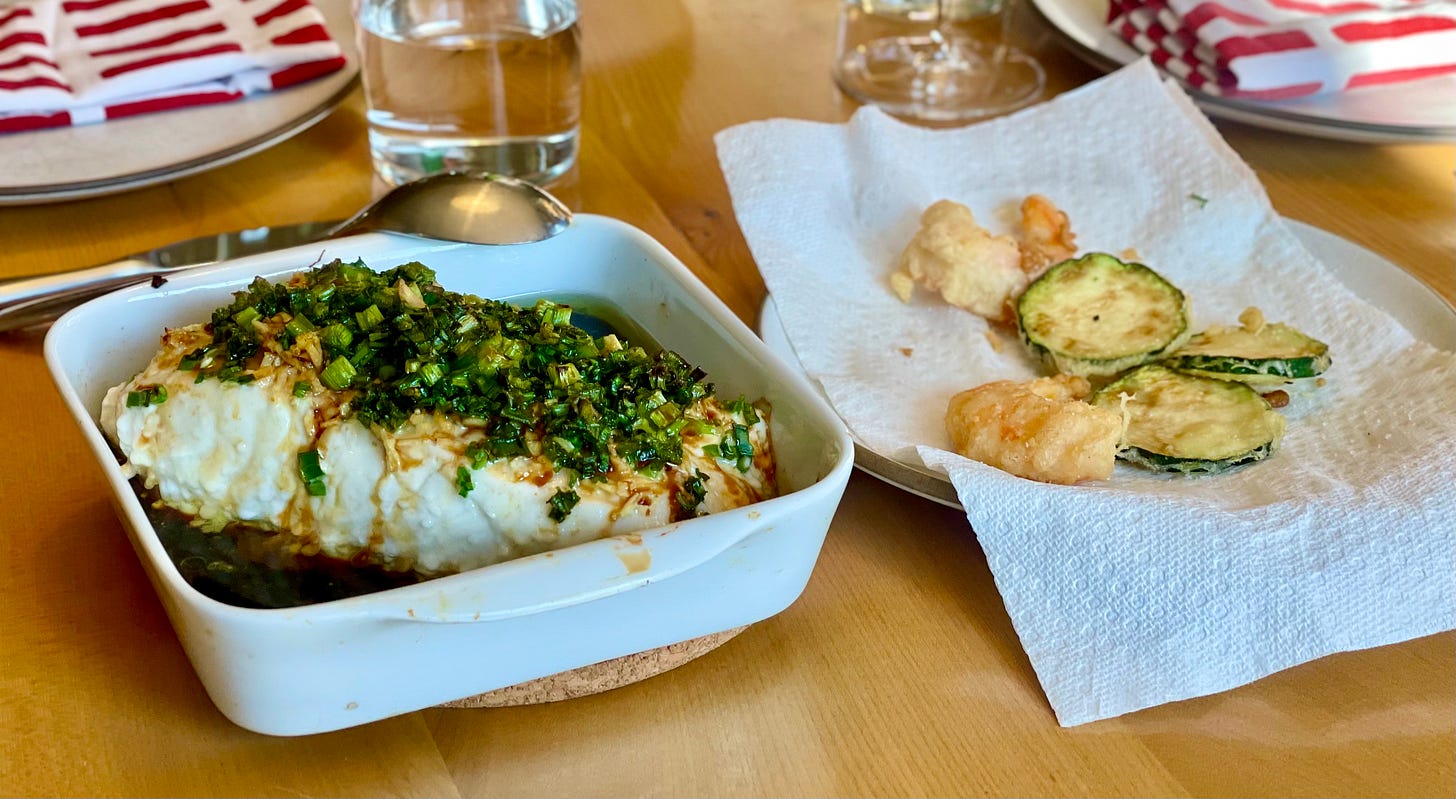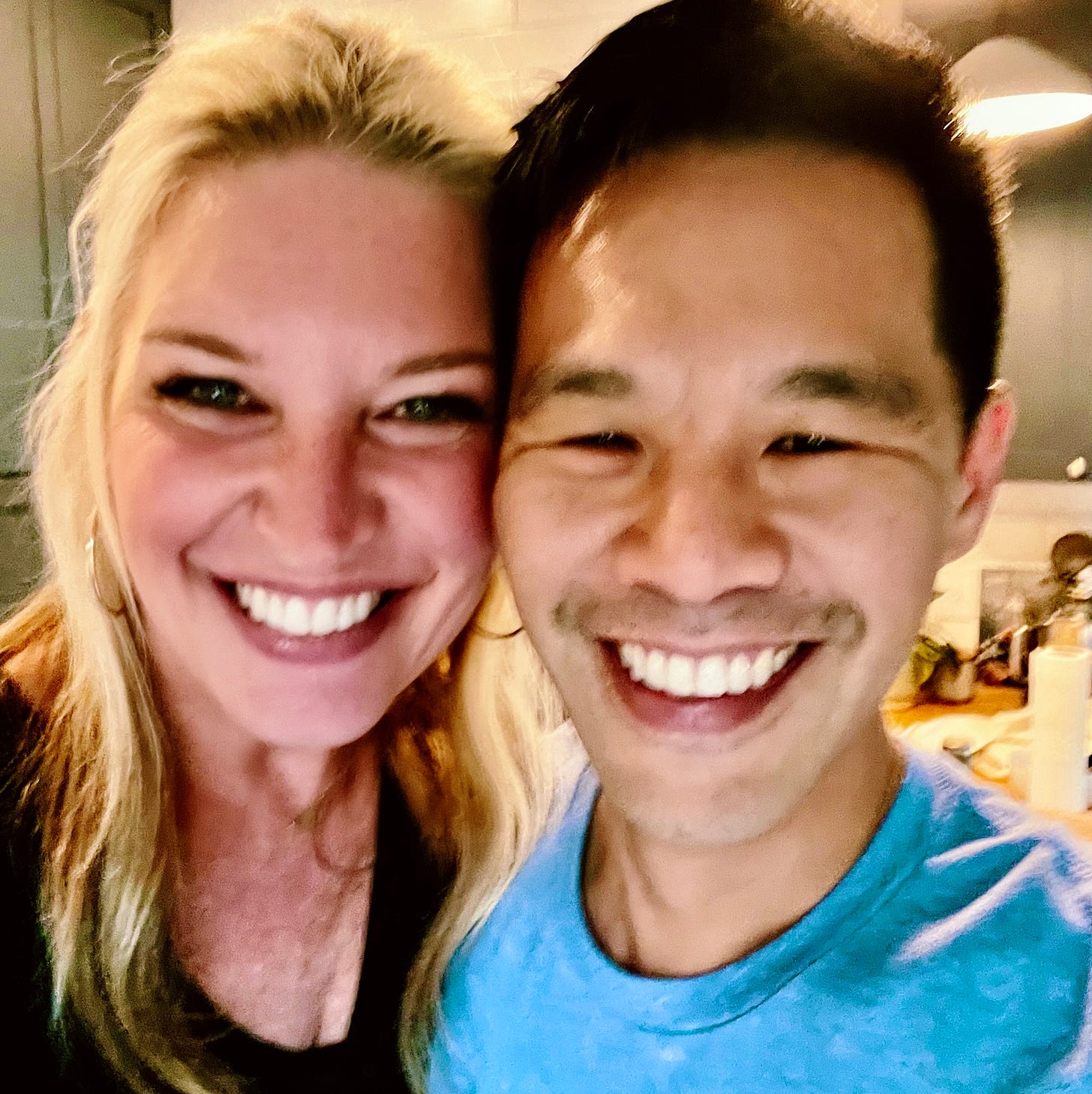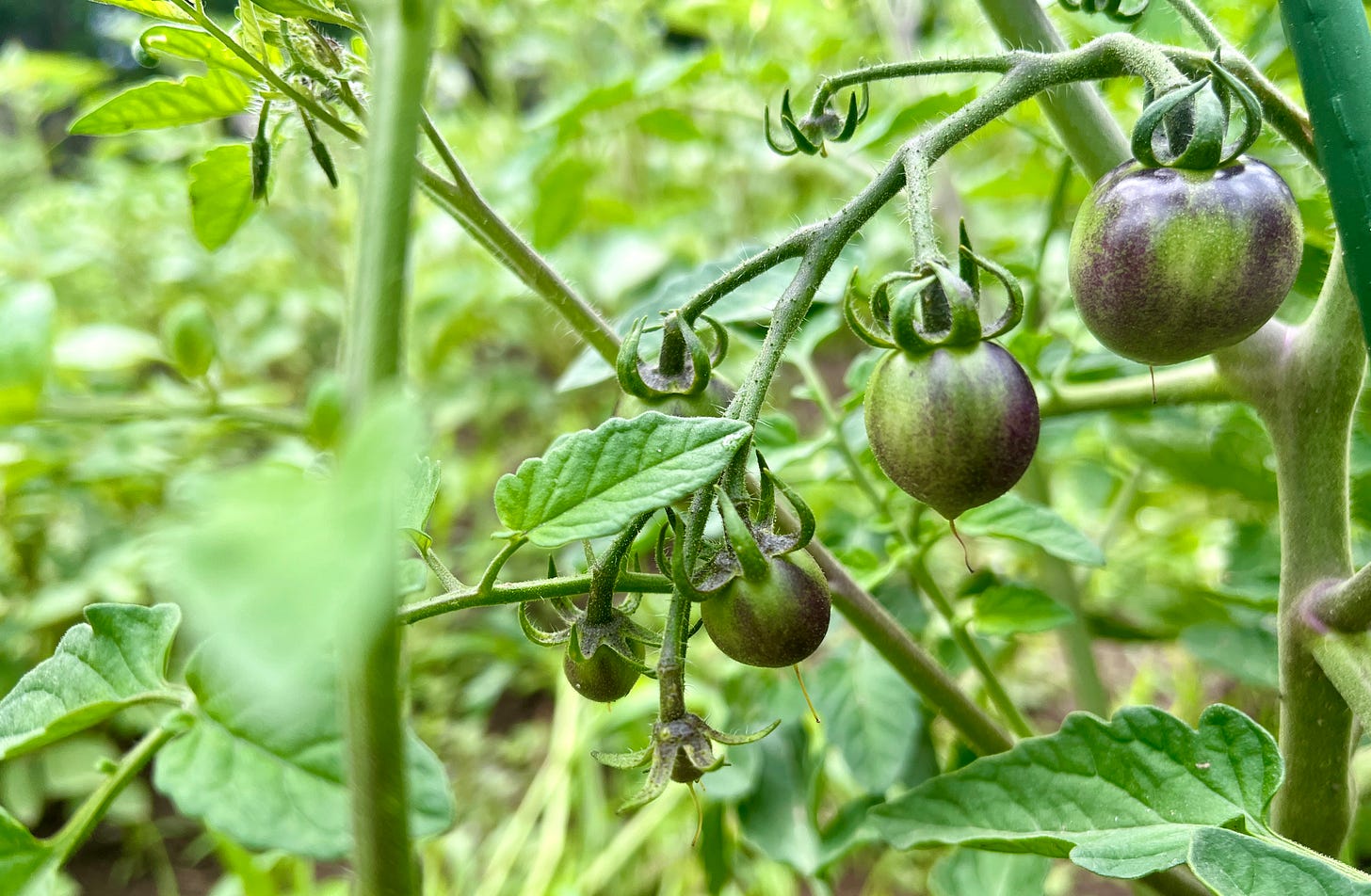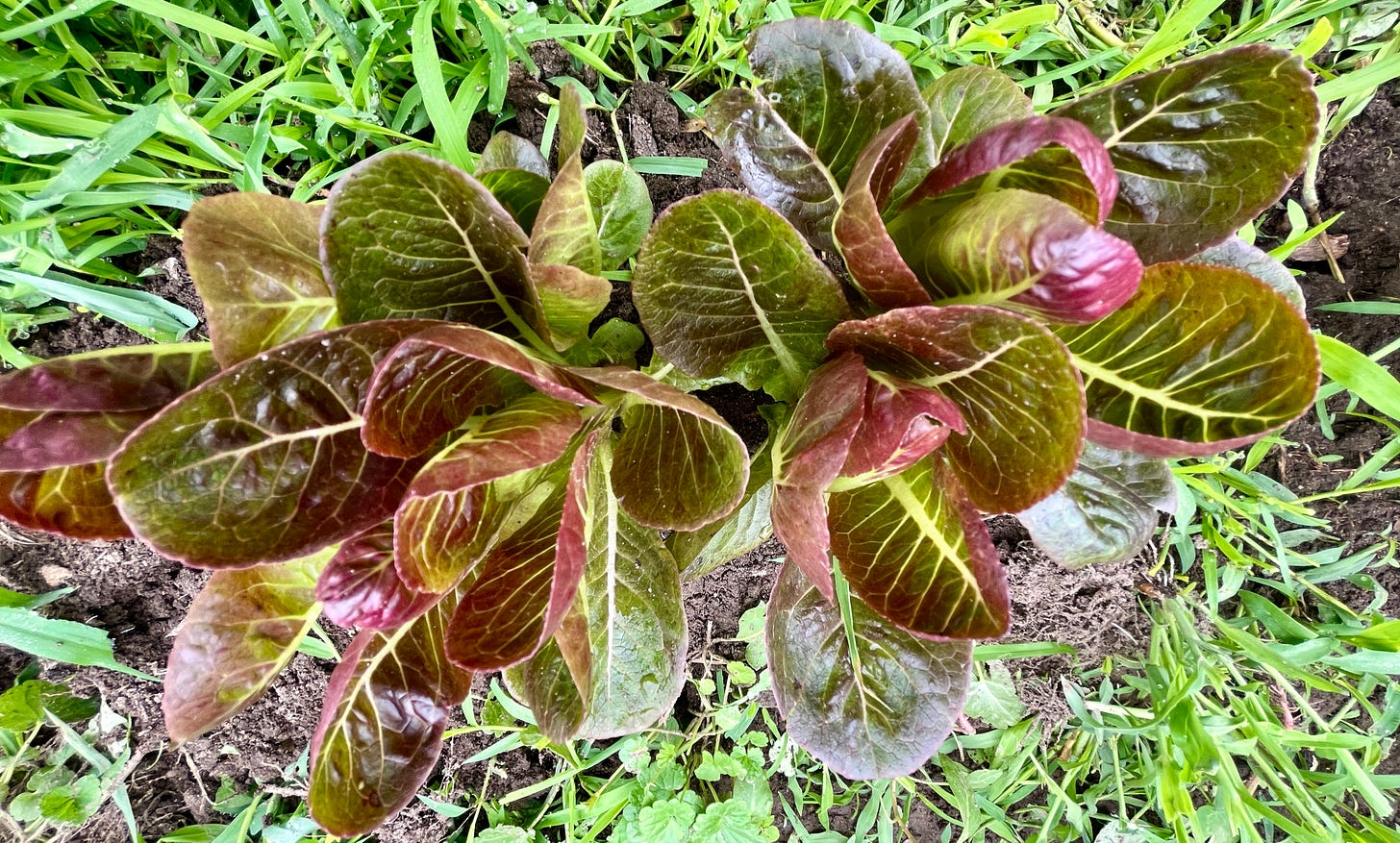Goodness and Mercy
Some fragmented thoughts on having a friend over for dinner, Psalm 23, stark reality and nurtured hope, drone-metal sanctuary, and the summer garden
Wednesday, June 26
Grand Rapids, Mich.
Our friend Jen, who lives in Texas, is spending some time out by Lake Michigan. So of course she had to come for dinner while she was in the vicinity.
She arrived on Sunday evening in characteristic fashion, bearing the biggest smile as well as some gifts: a homemade blueberry cobbler, vanilla ice cream, a bottle of good wine. In my book, though, the best gifts she brought were her Texas-mom hug, her very presence, and her appetite.
A friend’s visit was just the disruption I needed—a few hours in the kitchen, the prompt to imagine a menu, the impetus to harvest some chives and garlic scapes from the backyard, a prod to go to the Asian grocery store, a reason to cut some hydrangea from out front so that the table looked pretty.
A friend’s visit, and all that it inspired, felt like goodness and mercy to me.
--
“Surely goodness and mercy shall follow me all the days of my life.”
A couple of weeks, I preached on Psalm 23. As I was preparing the sermon, I fixated on that last line for a long time. I thought about it as I squished potato-beetle larvae in the community garden, and as I attacked the relentless field bindweed, and as I sat in the shady spot under the big old tree where Fozzie used to park himself when it got especially hot.
Psalm 23 is not the song of someone who basks in eternal sunshine or the prayer of a person who thinks they have everything all figured out. Beneath its familiar, seemingly resolute surface, there seems to me to be an ache. Sorrow, anxiety, and maybe even fear sit in the soil beneath those green pastures in which the Lord makes him lie down. And if the psalmist has to be led to still waters, I imagine he was quite familiar with treacherous currents and churning rapids.
To my ears, Psalm 23 sounds like a genre-bending blend of emo anthem and hype song. The psalmist tries his best—to be candid, to believe, to make sense of life, to hold onto hope. He’s reaching beyond himself. He’s surveying the landscape for signs of beauty. He’s searching the terrain, straining for a glimpse of the divine.
“Surely goodness and mercy shall follow me all the days of my life.”
This is where the brief psalm ends, not with testimony but with a statement of conviction and a confession of faith—and perhaps even with a dare directed toward the divine. I say “conviction” and “faith” because that last line is expressed in the future tense—as yet incomplete, still out there somewhere in the realm of possibility. And when I say “dare,” I mean that sometimes our prayers can also be tinged with the expectation of disappointment.
Surely, the psalmist says hopefully, as if attempting to speaking this truth into existence.
Surely I am not going to be let down.
Surely God will show up.
Surely.
“Surely goodness and mercy shall follow me all the days of my life.”
Isn’t it odd, too, how the psalm doesn’t say “shall precede me” or “shall be spread out before me” or “shall surround me”? Instead it says, “Goodness and mercy shall follow me.”
I don’t know about you, but I’d much prefer for goodness and mercy to pave the way ahead. But I suppose the psalm feels truer to reality. We walk into each new day’s unknown not seeing what blessings might await. Even when they come, we might recognize them only in retrospect. Goodness and mercy aren’t the twin engines in this psalm; they’re the caboose.

--
After Jen arrived, we gathered in the kitchen, Tristan poured the wine, and I fried up some tempura—shrimp, eggplant, zucchini, and of course, onion rings, because onion rings are the best. Then I finished cooking the rest of the meal: halibut with ginger and scallions; tofu stir-fried with asparagus, zucchini, peppers, and onions, with some gochujang for gentle heat; Chinese greens; eggplant with garlic sauce.
All of those dishes, I’ve made before, so I also decided to try one that I hadn’t: steamed chicken that’s then brined in rice wine and broth made from the chicken bones. While there are never guarantees in the kitchen, that’s especially true when you’re experimenting with something new. You can lean on skills you’ve developed, but there’s always risk. I liked this dish. The meat turned out juicy and flavorful.
At the table, we shared stories, and we laughed, and we discussed, and we lamented. The conversation ping-ponged throughout our lives and families, across oceans, and around the world.
There was too much food. It was just the three of us! As usual, Tristan said I’d cooked too much. Which, translated into Cantonese, means I’d cooked the right amount, as my mother taught me.
After Jen left, I felt such gratitude that she’d made the time and effort to drive to sit with us at our table. As I packed the leftovers into containers to pop into the fridge, I also thought of the meals we’d have in the coming days: maybe some chicken-salad sandwiches. We’d need to eat the fish tomorrow, because that’s not something that benefits from age. The tofu would still be good for a few days, though.
I passed through the living room to head upstairs to bed, and my eye caught on the neat pile of Fozzie’s blankets on the ottoman. Each one, I realized, had been a gift from someone who loved us and who cared about the Fozz.
So many signs of community. So many reminders that we weren’t—and aren’t—alone. So many nudges toward the recognition of sufficiency—and not just sufficiency but also abundance.
Surely goodness and mercy shall follow me.
What I’m Cooking: Here’s the recipe for that steamed chicken. I used only thighs, and I did marinate the chicken in soy sauce, sesame oil, and a little bit of lemon juice before cooking.
What I’m Reading: In so many ways, I am different from Jack Holloway, a polymathic, heavy metal-loving elder at Old First, our church in Brooklyn. What we share, though, is a deep conviction that the Church can meet the world, in all its diversity and in all its sorrow and in all its complexity, in so many different ways—and, it turns out, at all different volumes.
Holloway is the thoughtful heart and the innovative mind behind Despair Sanctuary, an occasional drone-metal service at Old First that is an incredibly loud expression of love. Yesterday, Harper’s Bazaar (yes, the very same Harper’s Bazaar that has had Kate Moss, Gisele Bündchen, and all manner of glitterati on its cover) published a moving reflection by the writer Elisabeth Donnelly on her experience of the Despair Sanctuary. “I was surrounded by people that night,” Donnelly writes. “I knew that my despair was not singular, that I was not alone in feeling like a chord out of tune.”
What Else I’m Reading: Offered without further comment, because I just can’t, is this essay on saying goodbye to a dog adopted during the pandemic, by the wonderful Margaret Renkl.
What I’m Growing: We’ve had some fierce thunderstorms here in West Michigan over the past few days—part of our neighborhood is still without power—and almost everything in the garden, particularly the weeds, is growing so well. Every day, there are new blossoms on the tomato and potato plants, the peppers get a little taller and stronger, and I see new zinnia sprouts. Our lettuce is looking gorgeous. The volunteers have shown up in force: the sunflowers, the tomatillos, the gladioli, even a couple of cosmos.
I still have never successfully grown poppies.
In our backyard, we added a couple of raised beds. We’ve got some tomatoes and basil going out there as well. And the milkweed! I love going out and observing all the different creatures that are flying and climbing all over the flowering milkweed.
I read the other day that milkweed’s genus, Asclepias, is named for the Greek god of medicine, Asclepius, whom the poet Pindar calls the “banisher of pain” and “craftsman of new health for weary limbs.” As a child, Asclepius was mentored in the healing arts by a great centaur. Because of his kindness to animals, legend has it that a grateful snake shared special knowledge with Asclepius.
How is your garden growing?
Thank you for all the kind words and expressions of condolence, which have come via comments and cards, email and flower delivery, since Fozzie died. We are truly grateful. To answer those who have asked and no doubt more who have wondered: No, we are not ready to get another dog anytime soon. That might feel right and good for some people, but not for us. We need time and space, and as Tristan has wisely said, we don’t ever want to feel as if we are replacing the Fozz. He is irreplaceable.
This Sunday, I’ll be preaching at Westminster Presbyterian Church in Grand Rapids. And on July 14th, I’ll be back in Cary, N.C., at my beloved Crosspointe; I hear Spencer LaJoye will be there to grace worship with their gorgeous voice that morning too. In both cases, you are most welcome to join us either online or offline, as you wish.
Yours,
Jeff










*ONCE* (only once in all the times I’ve heard it preached) I heard the pastor say the literal translation translation of the word “follow” should read “pursue”. I like the notion of being pursued by goodness and mercy. Your thoughts?
Thank you for sharing about how goodness and mercy are finding you. It prompted me to think about how they're showing up in my life, too.